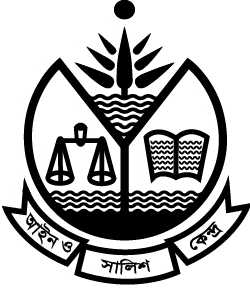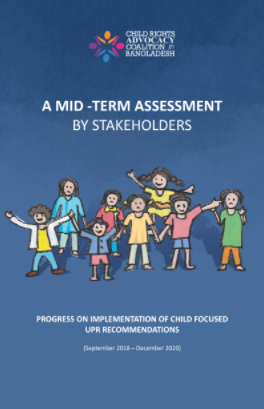Ain O Salish Kendra (ASK), our member from Bangladesh, prepared his Mid-Term Assessement by Stakeholders: Progress on Implementation of Child Focused UPR Recommendations (September 2018 – December 2020), which was published on 10 June 2021.
“The UPR is a human rights mechanism by United Nation under which the human rights situation of every UN member state is reviewed on a periodic basis. UPR aims to improve the human rights situation of the member states where every country gets the opportunity to present what actions they have taken to improve the human rights situation in their countries and to fulfill their commitments given in the previous cycle. During the four and half year cycle, there is no binding to provide information on the progress but the council encourages the member states to submit mid-term report on implementation of their commitments on a voluntary basis. In recent times, mid-term report is considered as an effective way to measure State’s engagement and commitment under this process.
Child Rights Advocacy Coalition in Bangladesh (CRACB), a coalition made of 10 national and international (4 national & 6 international)child rights based organizations who are working to carry out coordinated and concerted advocacy with the government of Bangladesh to uphold child rights in line with UNCRC and UPR commitments, has prepared this report assessing the implementation of the child focused UPR recommendations. The Coalition intended to present a stakeholders’ analysis on the status of implementation of accepted UPR recommendations in order to identify gaps and challenges and to provide specific recommendations for overcoming existing challenges. The Coalition also would like to encourage government to prepare and submit mid-term assessment report to
OHCHR.
At the same time, the Coalition is publishing this assessment report as a booklet so that the findings of the assessment can be disseminated widely to all relevant stakeholders. Especially child rights based organizations can use it while advocating with the government on their relevant issues.
We sincerely acknowledge the contribution of the Coalition members who are ActionAid Bangladesh, Ain o Salish Kendra, Bangladesh Shishu Adhikar Forum, Child Righs Governance Assembly, Educo Bangladesh, National Girl Child Advocacy Forum, Plan International Bangladesh, Save the Children, Terre Des Hommes – Netherlands, World Vision Bangladesh. We would also like to take this opportunity to thank other child rights based organizations and government authorities who have witnessed the provided information on this assessment. Child Rights Unit, ASK, has prepared the assessment and also coordinated the whole process of publication on behalf of the Coalition along with the support of the coalition member organizations. Save the Children (SCiB) has given technical assistance, guidance and required support during the report preparation period. We appreciate their efforts and thank them all.
We hope this assessment will present a reflection of the existing scenario and identify the issues that require advocacy by the civil society organizations working on child rights and eventually to be engaged with the Government. We expect that the government will also take into consideration the assessment and recommendations
while addressing the most under addressed recommendations of the UPR.”




